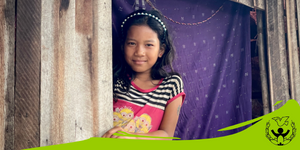
THE GOLDEN BEEHIVE IN A SLUM OF INSEIN
“Our future starts here!”
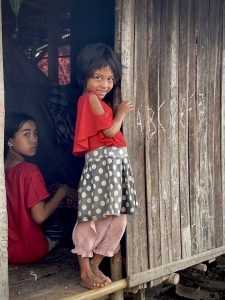
Great news from Yangon! We’re starting up a new education project in a slum of Insein. We are building a small early childhood education centre for children aged 4 years old, in order to start a work in pre-scholar education and, at the same time, to approach families with the aim of spreading awareness about sanitation and hygiene.
After the Nargis storm in 2008 a group of families come to a corner in Insein, building shacks on a junkyard. Nowadays in this slum there are 350 families, for a total of 1500 people, among them 89 children under 5 years old.
Shacks are illegal and families never got registered after their arrival in the city. Children born after their arrival never got registered, so officially they don’t exist and so they have no right to access education nor health system.
Hygienic conditions of the slum are precarious, with a consequent spread of infectious diseases. Families work on daily labour, often learning less than 5.000 MMK per day (around 2,50 €), without any perspective for the future.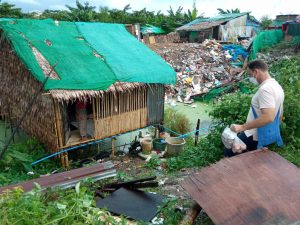
Scholastic cycle in Myanmar start at the age of 5 years old. Working with children aged 4 years old will allow us to start an education formation before the official cycle and, at the same time, to start working with families in order to organize meetings regarding hygiene and sanitation.
If political conditions will be better we would start also a work of support to families for registration, in order to make children able to access educational and health system.

The school’s name is Golden Beehive. Beehive as a community in which everybody is taking care of othersm in which everybody has his own role and leaders could take care of little ones. Golden because it is the sacred colour of Myanmar people.
The start up of the school and the elaboration of the program will be under the supervision of Josè Magro, psychologist with specialization in development and childhood psychology.
In the school will be developed propaedeutic subjects to school integration, but we will also focus on relational abilities and emotional development of children.
We will pay special attention on vulnerability cases, in order to start individual and family’s psychologic therapies.
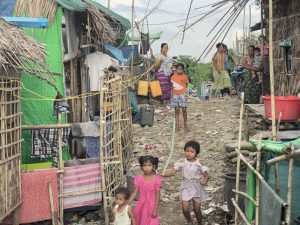
We will organize the day into 2 shifts, in order to welcome a greater amount of children, involving 30 children in the morning and 30 children in the afternoon.
In this way we would grant an high standard of education and we will reach up to 60 families.
In order to start the school we foresee following actions:
- Building
We already bought a small piece of land inside the slum and we started building the centre. I twill be a simple building: a hall with a kitchen and 2 toilets.
2. Teachers formation
We already selected 2 teachers who will follow classes. Together with teachers we are selecting 4 assistants, who will be trained by teachers themselves by the end of April.
3. Purchase of the material
-
We want to keep the centre as simple as possible, in order to have a versatile space. We will buy also educational games and didactical material.
- Functioning for one year
We foresee to start classes by the beginning of the summer. Due to the hard poverty of families and malnutrition incidence we foresee also providing food to 60 children who will attend the school. Our project’s staff will be 4 teachers, 1 cook and the project coordinator. Children attending the school and their families will have also granted access to health care. We will organize also periodic meetings with parents about parenting education, hygiene and sanitation.
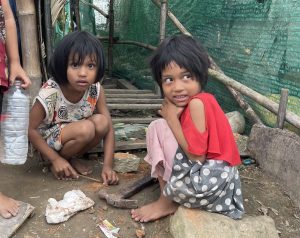
If you want to support this project you can see the project’s table and find supporting modalities at this page
We’re looking forward to see how it will be and to meet all children who are going to attend the new school, we will keep you updated!

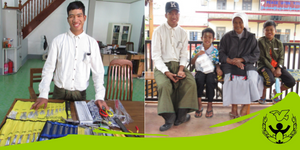
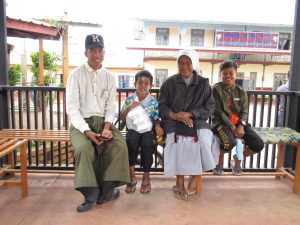 his siblings and their education. In 2019, New Humanity rushed to their aid by providing them with education, clothes, money to pay their hostel fees and much more. All the siblings were taken to Brother Felice Orphanage (in Nyaung Shwe Township) to improve their education. After a few months, the youngest was transferred to Phayar Phyu Orphanage (Taunggyi) because he needed special care from a psychologist to overcome his trauma. Despite the distance, they often visit each other and are all very happy to reside in a safe and peaceful environment. They said that they cannot imagine what their lives would have been like if they had stayed in their village. Their father visits them once or twice a year.
his siblings and their education. In 2019, New Humanity rushed to their aid by providing them with education, clothes, money to pay their hostel fees and much more. All the siblings were taken to Brother Felice Orphanage (in Nyaung Shwe Township) to improve their education. After a few months, the youngest was transferred to Phayar Phyu Orphanage (Taunggyi) because he needed special care from a psychologist to overcome his trauma. Despite the distance, they often visit each other and are all very happy to reside in a safe and peaceful environment. They said that they cannot imagine what their lives would have been like if they had stayed in their village. Their father visits them once or twice a year.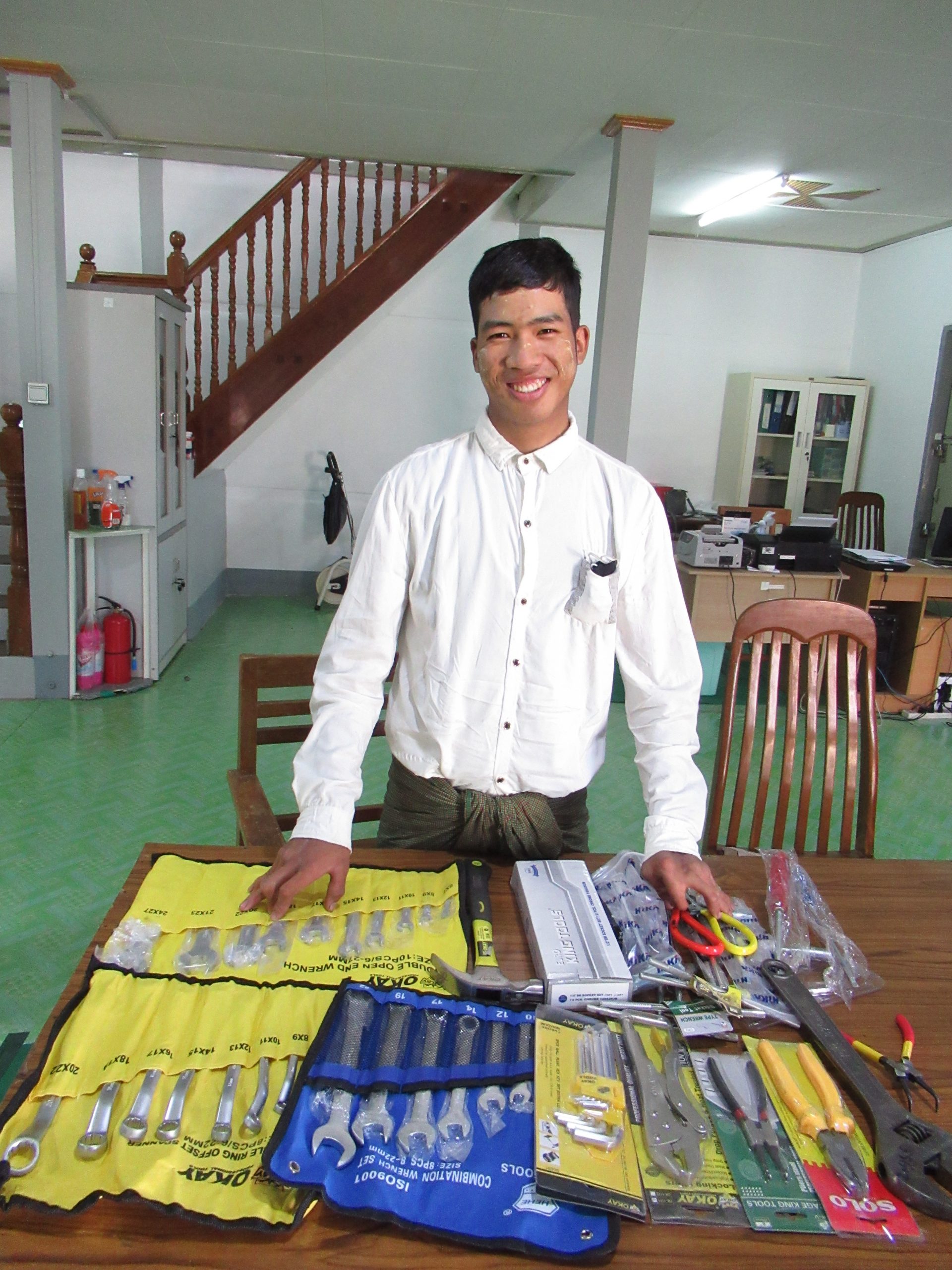
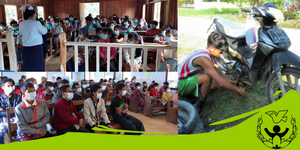
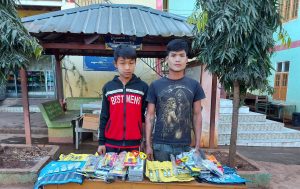 The first component of the project aims to organise activities to promote employment for young people and enable them to be as independent as possible, thus decreasing the unemployment rate in the villages. In this regard, New Humanity has designed several vocational trainings, such as the one on Motorbike Repair in which some guys between 12 and 18 years old have participated for 6 months.
The first component of the project aims to organise activities to promote employment for young people and enable them to be as independent as possible, thus decreasing the unemployment rate in the villages. In this regard, New Humanity has designed several vocational trainings, such as the one on Motorbike Repair in which some guys between 12 and 18 years old have participated for 6 months.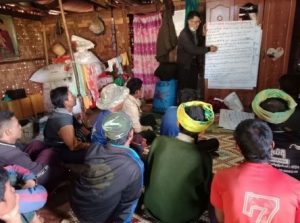
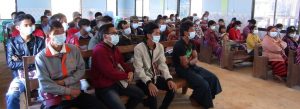
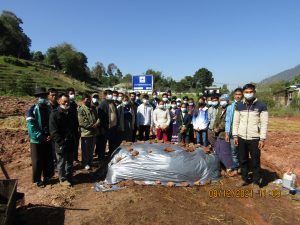
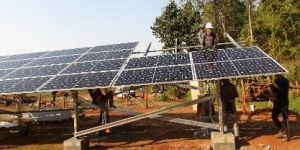
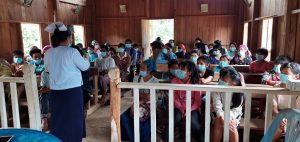 The third component of the project, which aims to improve the social inclusion of people with disabilities, involves the organisation of awareness-raising trainings in villages during which the causes of disability are explained, how to deal with a child with a disability etc., in which a lot of families participated.
The third component of the project, which aims to improve the social inclusion of people with disabilities, involves the organisation of awareness-raising trainings in villages during which the causes of disability are explained, how to deal with a child with a disability etc., in which a lot of families participated.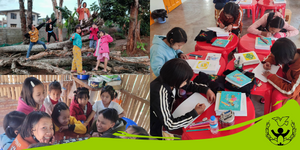
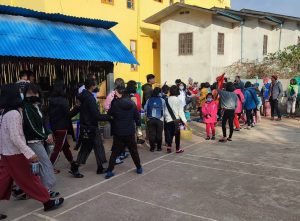 Thursday 3 February 2022 was a big day for hundreds of children in Taunggyi: a primary school for displaced children aged between 6 and 18 was inaugurated!
Thursday 3 February 2022 was a big day for hundreds of children in Taunggyi: a primary school for displaced children aged between 6 and 18 was inaugurated!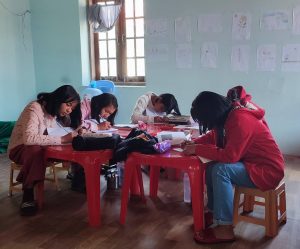
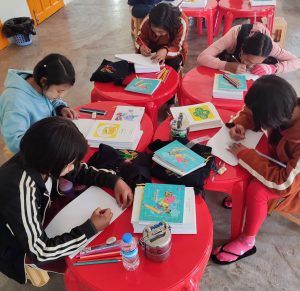
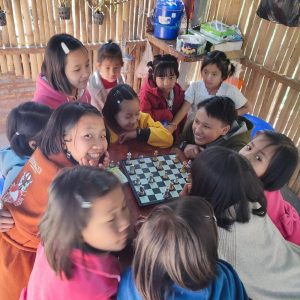
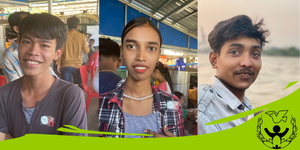
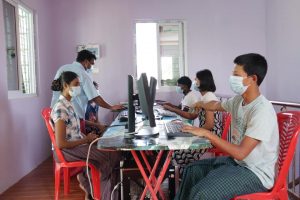
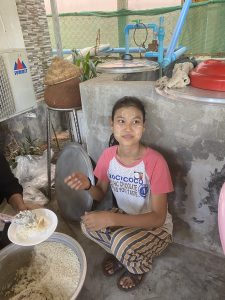 “I am Tun Nandar Win, I’m 17 years old. At the beginning I was not confident because I was afraid to talk to the elders, but after having attended Dayamit Community College I overcame my fears and now I am confident. I did not have a purpose in my life, now I am goal-oriented. Dayamit Centre made me feel at home and gave me space to express myself. My special thanks to Dayamit Community College”
“I am Tun Nandar Win, I’m 17 years old. At the beginning I was not confident because I was afraid to talk to the elders, but after having attended Dayamit Community College I overcame my fears and now I am confident. I did not have a purpose in my life, now I am goal-oriented. Dayamit Centre made me feel at home and gave me space to express myself. My special thanks to Dayamit Community College”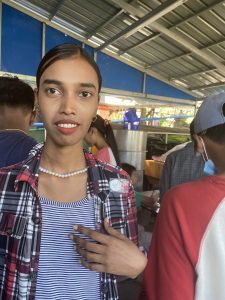 “I am 23 years old. I come from a very poor family; at the beginning I was shy because I was the oldest student in the college. Since I did not have money, I had begun to attend the college with a lot of worry. Mr. Barnabas visited my home, encouraged me and invited me to come to College. I never thought that I would be able to learn all the courses offered at Dayamit Community College, but today I can proudly say that I have achieved my goal. I began with zero, now I am ready to teach to the other students. All the credit goes to Dayamit. Thank you Dayamit”
“I am 23 years old. I come from a very poor family; at the beginning I was shy because I was the oldest student in the college. Since I did not have money, I had begun to attend the college with a lot of worry. Mr. Barnabas visited my home, encouraged me and invited me to come to College. I never thought that I would be able to learn all the courses offered at Dayamit Community College, but today I can proudly say that I have achieved my goal. I began with zero, now I am ready to teach to the other students. All the credit goes to Dayamit. Thank you Dayamit”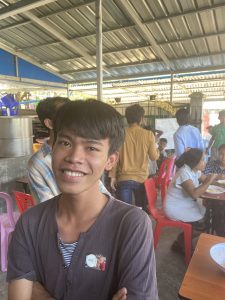 “I am already 18 years old, my parents at home always treat me as a kid, but at Dayamit Center I feel at ease, I have created my own space and I have made a lot of friends. Here, I also learnt so many lessons for my life. I came to Dayamit withouth any expectation but now I come back home with a lot of beautiful experiences”
“I am already 18 years old, my parents at home always treat me as a kid, but at Dayamit Center I feel at ease, I have created my own space and I have made a lot of friends. Here, I also learnt so many lessons for my life. I came to Dayamit withouth any expectation but now I come back home with a lot of beautiful experiences”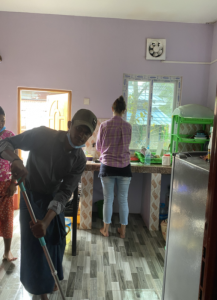 “I am 22 years old. After completing xth class, I was roaming around without any purpose in my life. I was not able to read properly in English. I was rude with elders and I used to fight with others. I was all the time on the street. After knowing Dayamit Center, my English knowledge, discipline, good manners have improved. Today I am a new person. For this, I am really thankful to Dayamit Community College”
“I am 22 years old. After completing xth class, I was roaming around without any purpose in my life. I was not able to read properly in English. I was rude with elders and I used to fight with others. I was all the time on the street. After knowing Dayamit Center, my English knowledge, discipline, good manners have improved. Today I am a new person. For this, I am really thankful to Dayamit Community College” “I am Kyaw Zaw Hein and I am 18 years old. I did not pass xth class. Therefore, I used to wonder around without any ambition in my life. I thought learning English and computer was difficult, but in reality, it is not that hard. Mr. Barnabas insisted me on coming to Dayamit Center. At first, I begged him to leave me alone because I did not have any interest to learn but today I am happy and thankful to Dayamit Center for having helped me to discover myself. I learnt how to relate to others. Now I can express myself in English. It all happened as a dream in my life. Thank you!”
“I am Kyaw Zaw Hein and I am 18 years old. I did not pass xth class. Therefore, I used to wonder around without any ambition in my life. I thought learning English and computer was difficult, but in reality, it is not that hard. Mr. Barnabas insisted me on coming to Dayamit Center. At first, I begged him to leave me alone because I did not have any interest to learn but today I am happy and thankful to Dayamit Center for having helped me to discover myself. I learnt how to relate to others. Now I can express myself in English. It all happened as a dream in my life. Thank you!” “I am 23 years old. I was worried about my future, therefore, I decided to attend Dayamit Center. I got a lot of experience from there. I received both human and technical formation for my future. I never thought that I could be able to speak in English and learn how to use computers. Today I am happy to say that I can communicate in English. My sincere thanks to Dayamit Community College”
“I am 23 years old. I was worried about my future, therefore, I decided to attend Dayamit Center. I got a lot of experience from there. I received both human and technical formation for my future. I never thought that I could be able to speak in English and learn how to use computers. Today I am happy to say that I can communicate in English. My sincere thanks to Dayamit Community College”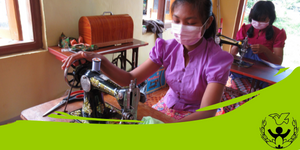
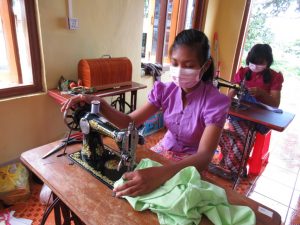
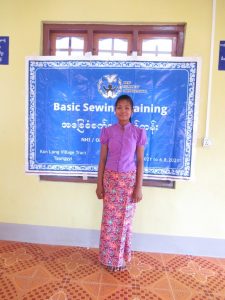
Recent Comments